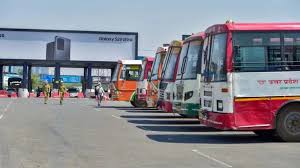In one of its largest transport enforcement drives in recent years, the Uttar Pradesh government has cancelled more than 8,300 vehicle permits and suspended hundreds of others, citing safety violations, environmental concerns and regulatory non-compliance.
The State Transport Authority (STA), which met on August 7, said 8,322 permits were revoked and another 738 suspended for 45 days. Officials described the action as a “zero-tolerance” response to operators who had either allowed their permits to lapse, breached eligibility conditions, or ignored statutory requirements.
Three permits linked to fatal accidents — each claiming at least four lives — were also cancelled. Operators in those cases have been barred from applying for fresh permits for a year. “Passenger safety and environmental protection are our foremost priorities,” Transport Commissioner Brajesh Narain Singh said, adding that essential transport routes would continue to operate uninterrupted.
The STA issued notices to about 1,200 operators whose permits expired more than seven years ago, and cleared pending applications for renewals and transfers in line with the Motor Vehicles Act.
As part of a broader environmental agenda, the state has ordered that from November 1, 2025, only BS-VI CNG, LNG or electric goods vehicles will be allowed in the National Capital Region. From the following year, all NCR buses must run on CNG, electricity or BS-VI diesel.
School transport operators have been warned that failure to comply with safety and fitness norms will lead to permit suspensions or cancellations.
The authority also withdrew 11 Letters of Intent from Accredited Driving Training Centres that failed to establish facilities within the mandated one-year period. New approvals will now require certification from national testing agencies.
To improve monitoring, the STA has tightened enforcement of Rule 103 of the Uttar Pradesh Motor Vehicles Rules, requiring detailed daily logs for each vehicle. A proposed online tracking system, integrated with the VAHAN 4.0 database, will allow officials to monitor routes, driver hours and passenger or goods movement in real time.
The measures mark an assertive push by the Yogi Adityanath administration to pair road safety with environmental regulation, sending a clear signal to the state’s powerful transport sector that compliance is no longer optional.


